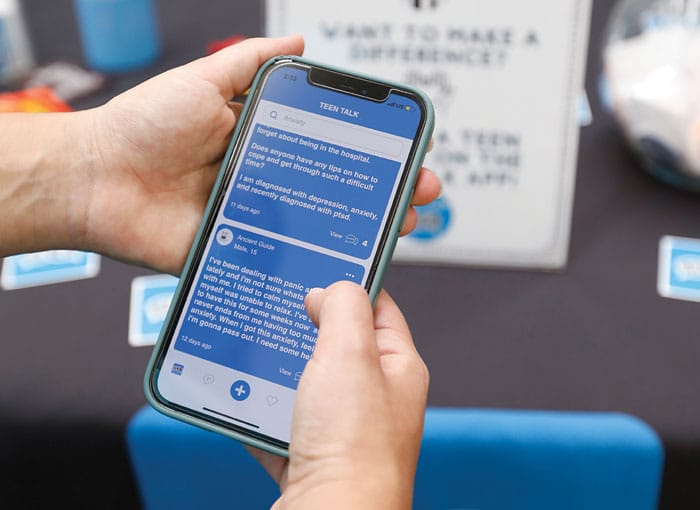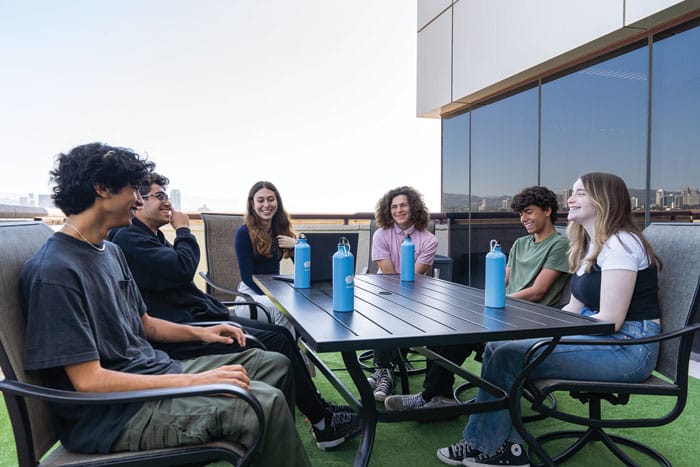
The Teen Advisors at the Teen Talk App are using their powers of empathy and experience to help their peers. And indeed, it’s a powerful thing.
“Every day I find myself in awe of the teen volunteers in our program,” Leeron Tzalka, the Teen Talk App community relations manager, told the Journal. “Their maturity and dedication to helping their peers keeps me hopeful about the future.”
Teen Talk, which is available on Android and iOS, is a non-sectarian program of Jewish Big Brothers Big Sisters of Los Angeles. The app’s user interface resembles your Facebook newsfeed and provides a free, anonymous, safe space for teens ages 13 to 19. App users can post and ask questions at any time.
“We found that teens are calling hotlines less and less, as they’re feeling less comfortable speaking on the phone. We consider ourselves a warm line rather than a hotline.” – Leeron Tzalka
“It is all post-related,” Tzalka said. “In doing research, we found that teens are calling hotlines less and less, as they’re feeling less comfortable speaking on the phone. We consider ourselves a warm line rather than a hotline.”
The Teen Advisors, who are supervised by mental health clinicians, are available on the app every day from 5 p.m. to 10 p.m. PT. They have all undergone a 50-hour training to learn reflective communication skills, crisis intervention and how to recognize the signs of mental health struggles. When there is a teen in crisis, they are brought into a private conversation with a mental health professional and receive referrals if they need them.
Tzalka believes this kind of a forum normalizes everything that teens are feeling. It makes them feel like they’re not alone. “Social media is a highlight reel,” Tzalka said. “People are watching things on TikTok and Instagram, and they feel [bad] at the end of the day.”
The Teen Talk space tells them that there are hard things in the world, but there are also resources and coping mechanisms. They are also peers who may have gone through — or are going through — similar things, who care about them and want to speak with them.

Photo by Cody Rapoport
The most common topics on the app relate to relationships, depression, suicide and abuse. As new topics are always emerging, the teens come together monthly for continuing education.
The app, which has been around since 2018, currently has 140 teen volunteers across the country. They support about 250 daily active users, and, this year, have had 6,000 conversations with teens around the world. Some of these ongoing conversations have 15 back-and-forth messages; others have 100.
While all teen users can read through other people’s posts, only the trained teens can respond.
“We know that this is a safe space that has trained teens speaking to them,” Tzalka said. “It’s not just unsolicited advice that they can get on the internet that’s not supervised by licensed professionals.”
To become an advisor, teens need to be in at least ninth grade and make at least a one-year commitment. Most of them stay longer, as they find it to be such a meaningful experience.
The other bonus: It’s a low barrier volunteer opportunity.
“We understand that not everyone has a parent or guardian who can drop them off at the hospital or the local food pantry to volunteer,” Tzalka said. “We wanted to reach teens who wanted to make an impact, but maybe didn’t have the ability to do so in person.”
Teen Talks’ national presence was a product of the pandemic. The app, which is based in Los Angeles, shifted to virtual training, enabling them to work with teens across the United States.
Tzalka said that a lot of their training is centered around Jewish values, concepts they share with all their advisors, no matter their religious connection.
“We even use words such as tikkun olam and kehillah in our training,” she said. “These values are important to our mission, as our app serves teens worldwide.”
The Teen Advisors’ experiences speak for themselves. To protect their anonymity, they only shared their first names.
“I became a Teen Advisor because I was a Teen Talk user in middle school,” Jonah, 17, told the Journal. “It was a rough episode in my life and Teen Talk helped to cultivate a lot of self-growth in me. When I found out that the organization needed volunteers, I wanted to contribute.”
Sarah, 15, said, “I used to think I was alone in my experiences, but now I know that other people are dealing with the same things I am.”
“I used to think that only adults could really help people, but now I know that teens have the power to help,” said Ben, 15.
“While it is a joy to witness their growth over the course of training and their shifts on the app, what is most rewarding is seeing our teens feel empowered to help others and themselves, discovering that they do not have to be ‘perfect’ to do so,” Lauren Veillette, the Teen Talk App Training Coordinator, told the Journal. “They just need to be their thoughtful and compassionate selves.”
Teen Talk offers about six to eight training cohorts a year, so if you know an interested teen, learn more at TeenTalkApp.com.























 More news and opinions than at a Shabbat dinner, right in your inbox.
More news and opinions than at a Shabbat dinner, right in your inbox.